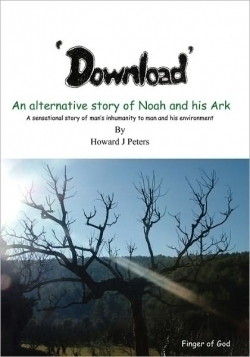Download
An Alternative Story of Noah and His Ark
The human race began somewhere—but where and how? These questions are the basis for Download, a novel about creationism with a futuristic twist.
Download depicts a planet that has been turned to desolation by pollution and violence. As one character observes, “They laughed about it in our grandparent’s [sic] time. They nearly stopped it happening, then. It’s too late now. Oh, I only wish that those people had listened!” The message—future generations will pay for the sins of the present—speaks to all of us.
Howard J. Peters’ Noah is a man of vision who believes “there must be some other way.” A philosopher and a technician with the courage of a general and the speculative powers of a scientist, Noah boldly takes the opportunity, when it arises, to clone and colonize. The journey of his spaceship, ARK, is inspired by his beliefs and a mysterious (divine?) video hologram—but despite Noah’s best intentions, it is not clear whether the new world his crew intends to populate will wind up like the old, rejected one.
Two things are evident, however: the new and innocent paradise is a place where rebirth can be welcomed in peace, and there is no birth without blood. As humans inherit “Erth,” a species must die.
The idea of interplanetary colonization to seek out a new Eden after the old one has been destroyed by man is not new in the sci-fi genre. Peters’ book has a complex plot and employs many interesting futuristic ideas and devices, such as the “hybrids,” an inferior race whose status is satirized with quips like “some of my best friends are hybrids.” The science of space travel is backed up with technical terminology that undoubtedly stems from the author’s career as an optometrist trained in high-tech refractive laser surgery.
Conceived by Peters as a potential film, Download is long and could have been cut to good effect. At times, a variety of subplots overwhelm the main story. The novel also suffers from basic sentence-level errors, like misplaced commas and apostrophes. A poignant scene in which Noah recognizes the new “rainbow sign” and offers a prayer is marred by an elementary mistake: “Please G-d let it be that humankind has learned its’ [sic] lesson.”
One of the dominant threads of the book is problematic—by the author’s own admission. In an interview for www.pageonelit.com, Peters states that “Afro-blacks” may see an unwelcome comparison of their race to the inferior hybrids. His dismissive response: “Humans did not like being compared to apes by Darwin!” This attitude will disturb many readers, as will a denigrating portrait of Ham, traditionally believed to be the father of the African races, as an undisciplined savage.
Still, Download impresses with an imaginative panorama, mingling diverse landscapes, spacescapes, and human-to-species encounters with the notion that no matter how life changes, people will act and react in a human way to new situations.
Reviewed by
Barbara Bamberger Scott
Disclosure: This article is not an endorsement, but a review. The publisher of this book provided free copies of the book and paid a small fee to have their book reviewed by a professional reviewer. Foreword Reviews and Clarion Reviews make no guarantee that the publisher will receive a positive review. Foreword Magazine, Inc. is disclosing this in accordance with the Federal Trade Commission’s 16 CFR, Part 255.

